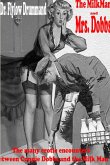"Marital Power Exemplified in Mrs. Packard's Trial, And Self-Defence from the Charge of Insanity" delves into the complex intersection of 19th-century marital power, women's rights, and mental health. Elizabeth Parsons Ware Packard recounts her personal experience, challenging the legal system and societal norms of the time. This historical account offers a powerful exploration of the insanity defense and the rights of individuals facing commitment. Set against the backdrop of 19th-century Illinois, Packard's narrative sheds light on the social and legal challenges surrounding the treatment of the mentally ill, particularly within the context of marriage. A significant contribution to legal history, this book provides valuable insights into family law, divorce, and separation dynamics, and the ongoing struggle for women's rights and autonomy. Packard's self-defence serves as a testament to the resilience of the human spirit and a poignant commentary on the limitations placed upon individuals labeled as "insane." This work has been selected by scholars as being culturally important, and is part of the knowledge base of civilization as we know it. This work is in the public domain in the United States of America, and possibly other nations. Within the United States, you may freely copy and distribute this work, as no entity (individual or corporate) has a copyright on the body of the work. Scholars believe, and we concur, that this work is important enough to be preserved, reproduced, and made generally available to the public. We appreciate your support of the preservation process, and thank you for being an important part of keeping this knowledge alive and relevant.
Bitte wählen Sie Ihr Anliegen aus.
Rechnungen
Retourenschein anfordern
Bestellstatus
Storno






![The Marriage of Near kin Considered With Respect to the Laws of Nations, the Results of Experience and the Teachings of Biology [electronic Resource] The Marriage of Near kin Considered With Respect to the Laws of Nations, the Results of Experience and the Teachings of Biology [electronic Resource]](https://bilder.buecher.de/produkte/74/74533/74533237m.jpg)
![Golden Wedding: [Mr. and Mrs. I.E. Dreisbach of Circleville, Ohio.] Golden Wedding: [Mr. and Mrs. I.E. Dreisbach of Circleville, Ohio.]](https://bilder.buecher.de/produkte/71/71612/71612910m.jpg)

